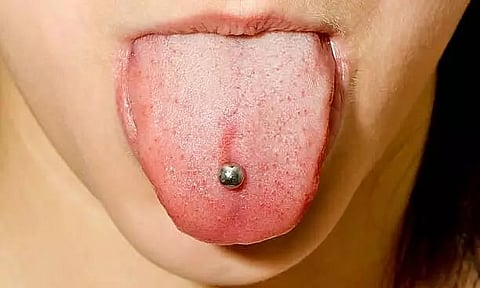
- Home
- Live Blog
- Breaking News
- Top Headlines
- Cities
- NE News
- Sentinel Media
- Sports
- Education
- Jobs

Body piercing is a well-liked method of expressing oneself. The metal jewellery used in oral piercings is available in a variety of designs, such as studs, rings, and barbells, just like it is for pierced ears. However, there are more health hazards associated with piercing your tongue, lips, or cheek than piercing your ears.
Your mouth is home to millions of microorganisms, and mouth piercings frequently lead to illness and oedema. For instance, you might choke if a piece of jewellery breaks off in your mouth or your mouth and tongue enlarge to the point where they block your airway. If you bite down on the piercing too firmly, you might break a tooth in some situations. Repeatedly clicking jewellery against teeth can potentially harm them. Additionally, more severe illnesses like hepatitis or endocarditis could result after oral piercing.
It can be difficult to speak, chew, or swallow if you have a pierced tongue, lips, cheeks, or uvula (the little tissue that hangs at the back of the throat). Additionally, it may also cause:
Discomfort, infections and pain: Your mouth is a wet habitat where a large number of germs breed, making it the perfect location for infection. If not treated right away, an infection can soon become life threatening. Additionally, a piercing could make your tongue expand, potentially obstructing your airway.
Gum, tooth, and filling damage: Biting or fidgeting with the piercing is a typical behaviour that can harm your gums and result in sensitive, cracked, or damaged teeth. Fillings may potentially be harmed by piercings.
Metal Hypersensitivity: Additionally conceivable are allergic reactions to the metal at the piercing site.
Nerve Harm: You might suffer a numb tongue following a piercing due to nerve injury, which is typically transitory but can occasionally be permanent. Your sensation of taste or how you move your tongue could both be impacted by the wounded nerve. Serious blood loss may result from injury to your tongue's blood vessels.
Extreme Drooling: The tongue piercing may cause you to produce more saliva.
Difficulty with Dental Appointments: Because the jewellery can block x-rays, it can hinder dental treatment.
If you already have piercings, consult your dentist or doctor right away if you experience any infection-related symptoms, such as pain, swelling, fever, chills, trembling, or a reddened look near the piercing. You should also use a mouthwash after every meal to keep the piercing site clear and free of any debris that might collect on the jewellery. Also aim to keep jewellery from clicking against teeth and from putting too much pressure on the piercing. And when you are speaking and chewing, be cautious and mindful of the jewellery's movement. You should also periodically check your jewellery's tightness (with clean hands). By doing so, it will protect you from swallowing or choking. Visit your dentist frequently, and don't forget to brush and floss every day.
Of course, the ideal course of action is to think about removing mouth jewellery before a problem arises. Do not puncture at random. Your life will become more demanding as a result of the piercing because it needs ongoing care and maintenance. For more details, consult your dentist. When participating in sports, take off your jewellery and wear a mouthguard to protect your mouth.
What is the lifespan of oral piercings?
Oral piercings can stay in your mouth permanently as long as they do not cause any infections and does not affect how your mouth normally functions. In addition to your routine checks, make sure to schedule an appointment with your dentist as soon as any pain or issues arise. Your best strategy is to stay away from oral piercings entirely due to the risks associated with them. Because although the initial would will heal, but if the jewellery becomes loose, it can cause severe harm to your teeth.